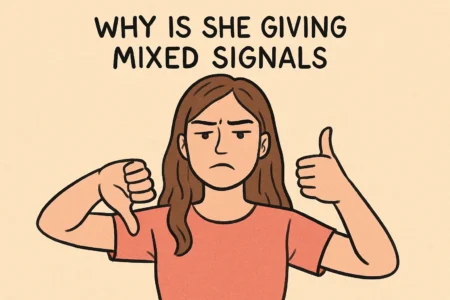Let’s just admit it. The word “argue” feels awful. It tastes like slammed doors and raised voices. It feels like that tight, acidic knot in your stomach. For years, I was convinced that arguing was the beginning of the end. A total failure. A relationship red flag.
I spent most of my twenties doing one of two things: either avoiding conflict like it was my job—I became a professional at swallowing my own feelings—or I’d walk into every disagreement wearing emotional armor, ready for a battle I absolutely had to win. Both left me feeling exhausted. Misunderstood. And incredibly lonely. It all came to a head during a truly ridiculous fight over laundry, of all things. That’s when it hit me: I didn’t know how to argue. I only knew how to fight.
That one thought changed everything. I became a student of healthy conflict. It turns out, it’s not about winning. It’s not about being right. It’s about being heard. Understood. Healthy arguing is a skill, one you can actually learn. It’s a tool that can take a moment of pure friction and turn it into connection. Into something deeper. This guide is everything I wish I’d known all those years ago. It’s for any woman who is just plain tired of the fighting cycle and ready to try something new.
More in Relationship Health Category
Key Takeaways
- Change Your Goal: Stop trying to win the argument. Focus on understanding each other. A healthy argument should actually bring you closer.
- Know Your Triggers: Learn to spot the signs that you’re about to lose your cool. Recognizing that internal alarm bell is the most critical first step.
- Speak for Yourself with “I” Statements: Don’t start sentences with “You always…” or “You never…”. Frame things from your perspective to avoid blame.
- Listen to Hear, Not to Respond: The goal of listening is to understand their side. Don’t just wait for your turn to talk. This one simple shift de-escalates everything.
- The Power of the Pause: If things get too heated, call a timeout. It’s not giving up; it’s a strategic move that prevents you from saying things you can’t take back.
- Always, Always Repair: How you reconnect after a disagreement is more important than the argument itself. Make repairing the connection your priority.
Why Do My Arguments Always Feel So… Personal?
Have you ever started a conversation about who should take out the trash, and five minutes later, it feels like you’re actually fighting about your entire relationship? Your worth? Whether your partner even loves you? You’re not crazy. This is normal. It happens because arguments are almost never about the thing we think they are about. Underneath the surface, we are fighting for our core emotional needs: to feel respected, to feel valued, to be heard, to feel safe and secure.
For the longest time, my husband and I had a fight I privately called “The Dishwasher Fight.” I’d get so frustrated watching him load it in a way that seemed completely illogical to me. I thought I was just being helpful by showing him the “right” way. But that’s not what he heard. He heard, “You’re incompetent.” He felt I was micromanaging him and didn’t trust him. The fight was never about the spoons. I was really fighting because I felt invisible and buried under the weight of domestic labor. He was fighting because he felt criticized and unappreciated. We were speaking two different languages. The minute we figured that out, we could actually start talking.
Is It Really About the Dishes? Uncovering the Real Issue
Next time you feel that friction starting, take a breath and ask yourself: What is this really about for me? Go deeper than the surface complaint. Are you feeling ignored? Disrespected? Unimportant? Is this actually about feeling lonely or disconnected?
When you can name that core emotional need, it’s like finding a map. You get to the heart of the issue so much faster. It changes the entire conversation. You stop lodging a complaint and start making a vulnerable request. Think about it. It’s much harder for someone to get defensive when you say, “I’ve been feeling really disconnected from you lately,” than it is when you say, “You never help me clean the kitchen!”
How Can I Stop Myself from Exploding?
I used to have a “flashpoint.” I’d be fine, fine, fine… and then, boom. I was not fine. A switch would flip. A tidal wave of anger or tears would come rushing out, often shocking my partner and, if I’m being honest, myself. This is called emotional flooding, a term from relationship expert Dr. John Gottman, and it is the single greatest enemy of healthy conflict. When you’re flooded, your body literally goes into fight-or-flight mode. Your heart rate soars, you can’t think clearly, and you lose access to the rational, kind, empathetic part of your brain.
Learning to recognize the physical signs of flooding was a complete game-changer. For me, it’s a heat that rises in my chest. My jaw clenches. I get this overwhelming urge to either scream or just run out of the door. That is your body’s fire alarm. It’s screaming at you to pause.
Are You Emotionally Flooded? Here’s How to Tell
You can’t have a rational conversation when your body is in survival mode. Research from universities like the University of California, Berkeley, shows that when we’re in this state, our ability to listen and process information accurately plummets. Your brain thinks it’s escaping a predator. You can’t negotiate about chores when you’re mentally running from a tiger.
Here are some signs you’re getting flooded:
- A Racing Heart: Your heart might pound in your chest, jumping to over 100 beats per minute.
- Shallow Breathing: You might notice you’re holding your breath or taking short, sharp breaths from your chest.
- Tunnel Vision: The world shrinks. It becomes impossible to see their perspective; you are drowning in your own feelings.
- An Urge to Flee or Fight: You either want to escape the room immediately (flee) or say the most devastatingly hurtful thing you can think of (fight).
Recognizing these signs is your cue. Stop. Not forever. Just for a moment.
What Do I Do When I Feel That Anger Rising?
The best tool for managing this is the timeout. No, this is not the silent treatment. It’s not storming off and slamming the door. This is a structured, pre-approved break designed to let you both cool down so you can actually solve the problem.
You have to agree on this when you’re not fighting. Come up with a word or phrase that either of you can use, like “I need a pause,” or “I’m flooded.” The rule is, the conversation stops. No last shots. You agree to take at least 20 minutes apart—that’s the minimum time it takes for the stress hormones in your system to recede. The second rule is crucial: you cannot spend that time stewing. You have to do something that actively calms your nervous system. Listen to music. Go for a quick walk. Read a chapter of a book. Do anything other than replaying the argument in your head. The goal is to come back with a clearer mind.
How Can I Say What I Mean Without Starting a War?
The words you choose in an argument can build a bridge or a wall. For most of my life, my words built walls. My go-to sentence starters were “You always…” and “You never…”. These are words of accusation. They instantly force the other person to defend themselves. The conversation is no longer a conversation; it’s a court case, and they are on trial.
Just think about how it feels to hear, “You never listen to me.” Does it make you want to listen? No. It makes you want to immediately list every single time you did listen. You stop hearing their point and start building your defense.
What Are “I” Statements and Why Do They Work?
The fix is to consciously swap your “you” statements for “I” statements. This isn’t just a silly therapy trick; it’s a fundamental change in how you communicate. An “I” statement keeps the focus on your feelings and your experience. And guess what? No one can argue with how you feel. It’s your truth.
The formula is beautifully simple: I feel [your emotion] when [the specific, objective situation] because [the impact it has on you].
Let’s see it in action:
- “You” statement: “You are always so messy and never help clean up.” (This feels like a character assassination.)
- “I” statement: “I feel overwhelmed and stressed when I see coats and shoes left in the living room because it makes me feel like all the responsibility for keeping our home tidy is on my shoulders.” (This is just an expression of your feeling. It invites help, not a fight.)
Can you feel the difference? The first one is a battle cry. The second is an invitation to connect and solve a problem together. It takes practice. It will feel clunky at first. But it is one of the most powerful changes you can make.
Am I Really Hearing Them, or Just Waiting to Talk?
I am so guilty of this. For years, I thought I was a great listener. I was not. I was a great rebuttal-preparer. As my partner was talking, my brain was running at a million miles an hour, grabbing onto things I disagreed with, formulating my counter-attack. I wasn’t listening to understand him. I was listening to win. That is not communication. That’s debate club. And in a relationship, nobody wins the debate.
True, active listening means you have to put your own agenda aside. It requires you to silence your inner lawyer and just give your full, undivided attention to what they are saying—their words, their tone, their body language. The goal is to truly understand their perspective, even if you don’t agree with it.
How Can I Become a Better Listener During a Fight?
This does not come naturally, especially when you feel attacked. It’s a conscious practice. It’s a discipline. But it will change the entire tone of your disagreements.
Here’s where to start:
- Just. Listen: Make a deal with yourself that for two minutes, you will only listen. No interrupting. No planning your response. No sighing or eye-rolling. Your only job is to receive the information.
- Summarize and Validate: When they’re done, try to reflect back what you heard. “Okay, so what I think you’re saying is…” or “It sounds like you felt really hurt when…”. This accomplishes two amazing things: it confirms you understood them, and it makes them feel understood. Validation isn’t agreement. You can say, “I can see why you would feel that way,” without agreeing with their conclusion. It’s a phrase that works miracles.
- Get Curious, Not Furious: Ask questions. Not “why would you think that?!” but genuine, open-ended questions. “Can you tell me more about that?” “What was that feeling like for you?” This signals that you care more about understanding them than about being right.
I’ll never forget the first time I really committed to this. My husband was upset about our weekend plans. My default mode would have been to get defensive and list all the reasons my plan was better. Instead, I bit my tongue and just listened. When he finished, I said, “It sounds like you’re feeling totally overwhelmed and what you really need is some quiet downtime this weekend.” The look of relief on his face was instant. He just nodded. The fight was over. We were on the same team again.
What if We Just Can’t Agree?
Sometimes, you’ll do everything “right,” and you will still find yourself at an impasse. You’ve both stated your feelings calmly, you’ve listened, and you still fundamentally disagree. This used to send me into a panic. I thought it was a sign we were doomed. It’s not. A healthy relationship isn’t about having no differences; it’s about how you manage the differences you have.
The work of Dr. John Gottman found that a wild 69% of a couple’s conflicts are perpetual problems. They are not going away. These are rooted in fundamental differences in your personalities or values. Maybe you’re a saver and he’s a spender. You’re an introvert, he’s an extrovert. You will not “solve” this. The goal is to stop trying to solve it and instead learn to talk about it without causing World War III.
Is Compromise Always the Answer?
We’re told compromise is the golden ticket, but sometimes it just means both people end up vaguely unhappy. A better goal is often just acceptance and management. How can we live with this difference? Maybe you bend on this issue because he bends on another one that’s more important to you. Or maybe you just accept that you’re never going to agree on how to load the dishwasher, and you decide to let it go and focus on the ninety-nine other things you love about each other.
The secret is to approach these forever-problems with a bit of humor and a lot of grace. You have to remember your partner isn’t trying to be difficult. They are just… different from you. You can build a beautiful life together without agreeing on everything. You just can’t do it if you can’t respectfully live with those disagreements.
How Do We Find Our Way Back After a Bad Argument?
This might be the most important part of all: what happens after the fight. The repair attempt. That’s the moment you reach for each other again. It’s the apology, the hug, the silly joke that finally breaks the tension. It’s the “I love you” that confirms the connection is bigger than the conflict. According to researchers, the success or failure of repair attempts is one of the biggest predictors of a couple’s long-term happiness.
For years, I was awful at this. After a fight, I’d retreat behind a wall of silence. I was hurt, and I wanted him to know it. But that silence wasn’t protecting me; it was punishing him. It kept us both feeling lonely and resentful. It meant the argument never really ended; it just went underground, waiting for the next opportunity to explode.
What Does a Good “Repair” Actually Look Like?
A repair doesn’t have to be a grand gesture. It just has to be sincere. It means taking responsibility for your part of the mess, even if you’re convinced your part was smaller. A good apology is about your actions, not their feelings.
- Bad apology: “I’m sorry you feel that way.” (This is a non-apology that subtly blames them for their feelings.)
- Good apology: “I’m sorry I raised my voice. That wasn’t fair to you, and I’ll work on it.” (This takes full ownership of your behavior.)
Repairing goes beyond just saying sorry. It’s the act of turning back toward your partner. It’s making them a cup of tea. It’s reaching for their hand. It’s saying, “We’re okay. We’ll get through this.” That is how you build trust. That is how you prove, over and over again, that your relationship is strong enough to handle the pressure. And what on earth is more valuable than that?
FAQ – How to Argue

What is the main goal of healthy arguing in a relationship?
The main goal of healthy arguing is to be heard and understood, not to win or be right, and to bring partners closer through respectful communication.
How can identifying core emotional needs improve conflict resolution?
Recognizing core emotional needs, such as feeling respected and valued, allows couples to address the real issues beneath surface disagreements, leading to more meaningful resolution.
What are signs that I am emotionally flooded during a conflict?
Signs include a racing heart, shallow breathing, tunnel vision, and a strong urge to flee or fight, indicating that your body is in fight-or-flight mode and it’s time to pause.
What is an effective way to manage rising anger during an argument?
The most effective way is to agree on a structured timeout, where both partners take at least 20 minutes apart to calm down before continuing the discussion.
How can I repair a relationship after a heated argument?
A good repair involves sincere actions such as taking responsibility, offering a genuine apology, and reconnecting through kind gestures like a hug or a comforting word, to rebuild trust and connection.




